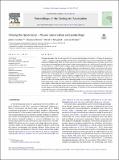Valuing the Quaternary – nature conservation and geoheritage
Abstract
This paper introduces the Special Issue of the Proceedings of the Geologists' Association on ‘Valuing the Quaternary – Nature Conservation and Geoheritage’, arising from the International Union for Quaternary Research (INQUA) Congress in Dublin, in July 2019. It presents an overview of the values of Quaternary geoheritage, which merit recognition as an integral part of nature conservation, to protect priority sites and features for scientific research and education, and to deliver wider ecological, cultural and aesthetic benefits. The paper highlights the benefits of incorporating knowledge and understanding of Quaternary geoheritage for nature conservation and society. Palaeoenvironmental, palaeoecological and palaeobiological archives are a key source of ecological and environmental data that allow learning from the past to help address contemporary conservation challenges such as biodiversity loss, anthropogenic pressures and climate change. Quaternary science plays a vital part in supporting the wider nature conservation agenda, including strengthening the role of protected and conserved areas in the sustainable management of natural capital and ecosystem services, climate change adaptation, marine conservation, nature restoration and recovery, connecting people and nature and informing nature-based solutions to threats faced by society. However, challenges remain to achieve protection of key geoheritage sites and landscapes globally, and to integrate better understanding of geodiversity in nature conservation research, policy development and practice to help address the twin crises facing nature conservation – biodiversity loss and climate change. Quaternary studies provide temporal and spatial perspectives to inform forward-looking nature conservation that is dynamic rather than static in outlook.
Citation
Gordon , J E , Brown , E J , Brigland , D R & Brazier , V 2023 , ' Valuing the Quaternary – nature conservation and geoheritage ' , Proceedings of the Geologists' Association , vol. 134 , no. 4 , pp. 357-387 . https://doi.org/10.1016/j.pgeola.2023.07.003
Publication
Proceedings of the Geologists' Association
Status
Peer reviewed
ISSN
0016-7878Type
Journal article
Collections
Items in the St Andrews Research Repository are protected by copyright, with all rights reserved, unless otherwise indicated.

